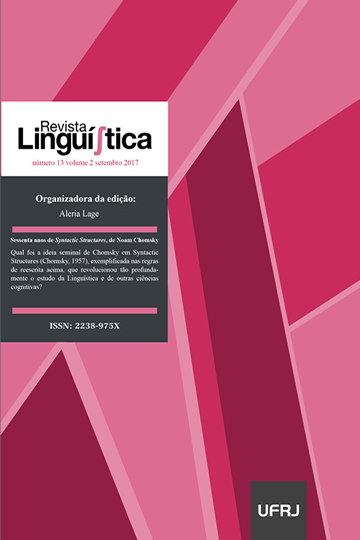Discrete Infinity and the Syntax-semantics Interface
DOI:
https://doi.org/10.31513/linguistica.2017.v13n2a14031Resumo
Discrete infnity was identifed as a central feature of human language by Humboldt who famously spoke of making infnite use of fnite means. Later Chomsky refocused attention on this property starting with Chomsky (1957). In a number of works since, Chomsky has repeatedly stressed the centrality of infnity for understanding language. For example, Chomsky (2007) writes that “An I-language is a computational system that generates infnitely many internal expressions”. Chomsky also noted that the property of discrete infnity is shared by the natural numbers and language. This connection has also caught the interest of others in cognitive science (e.g. Dehaene 1999, Dehaene et al. 1999). In this squib, we want to discuss concrete reductions of discrete infnity of the natural number. Specifcally, we want to investigate the extent to which this connection is compatible with current views of the syntax-semantics interface. We argue that merge alone is not enough to derive infnity, but a minimal lexicon is necessary, as Chomsky (2007) has noted in passing. We furthermore show that Chomsky's assertion that a single lexical item is sufcient to generate the natural numbers depends on two assumptions -- an untyped lambda calculus, and a specifc interpretation of the syntactic Merge operation.
---
DOI: http://dx.doi.org/10.31513/linguistica.2017.v13n2a14031
Downloads
Downloads
Publicado
Edição
Seção
Licença
Autores que publicam na Revista Linguí∫tica concordam com os seguintes termos:
Os autores mantêm os direitos e cedem à revista o direito à primeira publicação, simultaneamente submetido a uma licença Creative Commons que permite o compartilhamento por terceiros com a devida menção ao autor e à primeira publicação pela Revista Linguí∫tica.
Os autores podem entrar em acordos contratuais adicionais e separados para a distribuição não exclusiva da versão publicada da obra (por exemplo, postá-la em um repositório institucional ou publicá-la em um livro), com o reconhecimento de sua publicação inicial na Revista Linguí∫tica.

A Revista Linguí∫tica é uma revista do Programa de Pós-Graduação em Linguística da UFRJ e se utiliza da Licença Creative Commons - Atribuição-NãoComercial 4.0 Internacional (CC-BY-NC)









